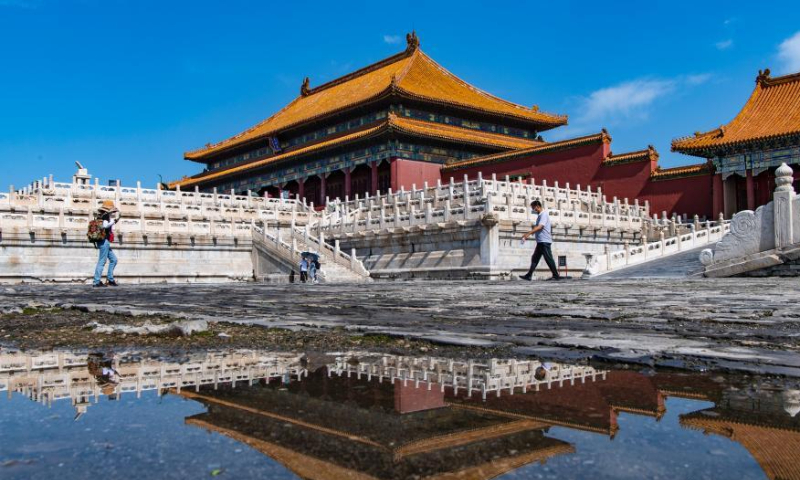
A mirror image of the Palace Museum is reflected in the water after rainfall in Beijing, July 13, 2022. (Photo: China News Service/Hou Yu)
The Palace Museum is expected to become an international first-class museum, a model for the preservation of the world's cultural heritage and a cultural parlor for the exchange and appreciation of civilizations, said Wang Xudong, Director of the Palace Museum, in an interview before the opening of the 20th National Congress of the Communist Party of China (CPC) on Sunday.
As one of the delegates to the 20th CPC National Congress, Wang was interviewed in the "Delegates' Corridor" ahead of Sunday's opening session. Reporters asked him what new thoughts and intentions he had for strengthening international cultural exchange and mutual appreciation, as he had proposed earlier to build a platform for cultural exchange through cultural relics and museums to promote understanding and bridge differences among countries and peoples.
Wang offered four visions for the future of the Palace Museum - to build an international first-class museum, a model for the preservation of world cultural heritage, a leader in the integration of culture and tourism, and a parlor of Chinese culture for the exchange and mutual appreciation of civilizations.
The Palace Museum has a history of more than 600 years, carrying 5,000 years of Chinese civilization, through which we can see the exchange and integration of people from different geographic, ethnic and religious backgrounds. Chinese civilization has been able to stay alive because of this openness and tolerance, which brings us inspiration for today, Wang said.
"In my 32 years of heritage conservation experience, I have also participated in or led many international collaborative projects, working with counterparts in the US, Japan, the UK, Australia, France, Italy and many other countries," Wang recalled. "They traveled thousands of miles to China to protect the common cultural heritage of humankind, because they realized that the cultural heritage carries the common values of the whole humankind."
"In the process of cooperation, there were also cultural differences at the beginning, but we sought common ground and kept integrating and understanding," he said.
Wang has also traveled to many countries to participate in such dialogue and exchanges, "and through these we were able to find more common ground and seek common ground while reserving differences. I think that seeking common ground while reserving differences should be a common ideology that we all abide by in this day and age," he said.
"It is our very important vision and mission to build the Palace Museum into a Chinese cultural parlor of civilization exchange and mutual appreciation," he said, pointing out that through the exchange of people, this mutual understanding and communication will definitely increase trust among nations and people in the academic and civil spheres.
Only then will the barriers and suspicions dissolve. We will understand each other more and respect different civilizations, customs, religious and cultural pluralism, he said.
"Such a mission requires the participation of all sectors of society, the participation of international counterparts, and constant learning from counterparts at home and abroad," Wang said.
Global Times




